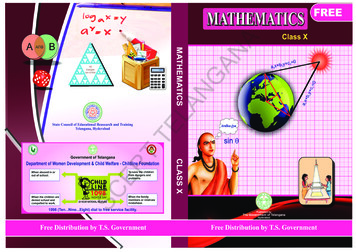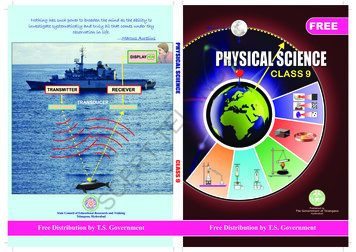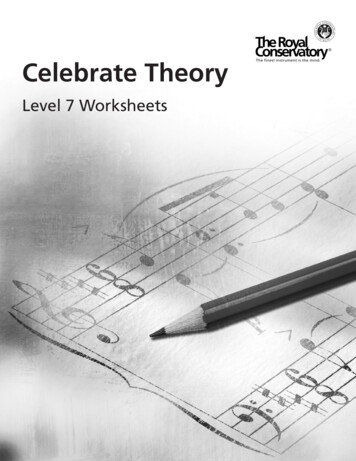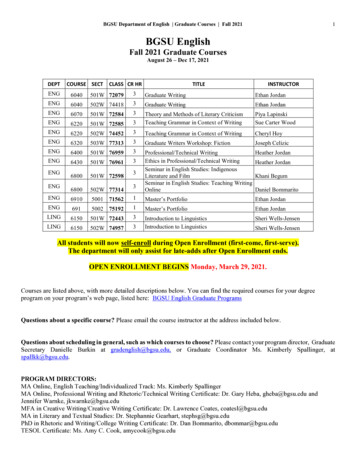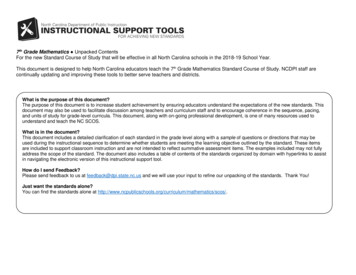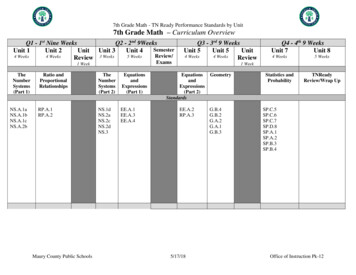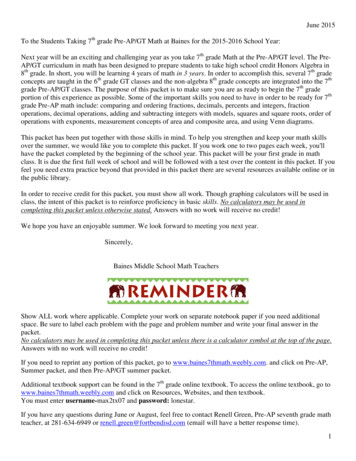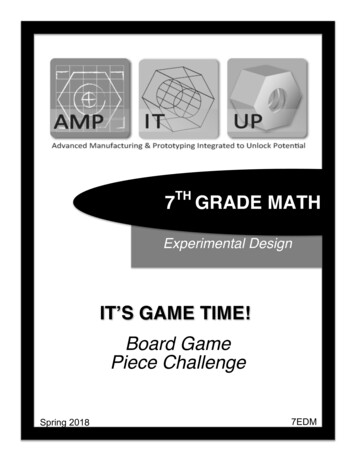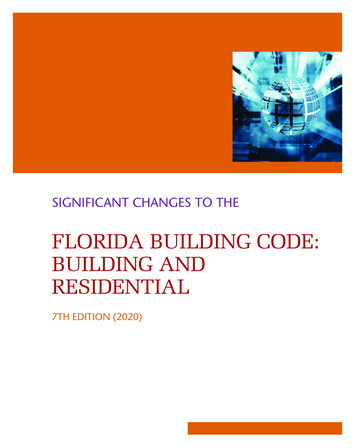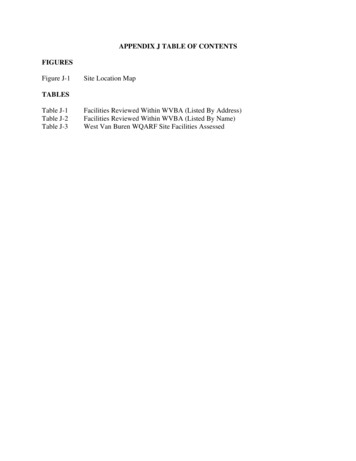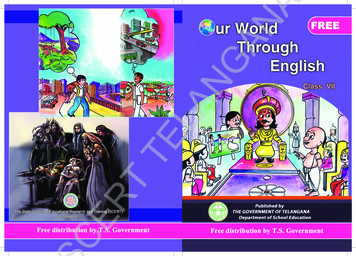
Transcription
RTCELATENGAN
imagination had no limits, I dreamed ofchanging the world. As I grew older and wiserI realized the world would not change andI decided to shorten my sights somewhat andchange only my country. But it too seemedimmovable.As I entered my twilight years, in one lastTEdesperate attempt, I sought to change only myNGANWhen I was young and free and myLACan you change the world?family, those closest to me, but alas! Theywould have none of it.And now here I lie on my death bed andrealize (perhaps for the first time) that if onlyRTI’d changed myself first, then by example I mayhave bettered my country, and who knowsCEI may have changed the world.
TERSCANAGNLATE
AAN Government of Telangana, Hyderabad.NGFirst Published 2012New Impressions 2013, 2014, 2015, 2016, 2017,2018, 2019, 2020All rights reservedTELANo part of this publication may be reproduced, stored ina retrieval system, or transmitted, in any form or by anymeans without the prior permission in writing of thepublisher, nor be otherwise circulated in any form ofbinding or cover other than that in which it is publishedand without a similar condition including this conditionbeing imposed on the subsequent purchaser.ERTThe copyright holder of this book is the Director ofSchool Education, Hyderabad, Telangana.This book has been printed on 70 G.S.M. MaplithoTitle Page 200 G.S.M. White Art CardSCFree Distribution by T.S. Government 2020-21iiPrinted in Indiaat the Telangana Govt. Textbook Press,Mint Compound, Hyderabad,Telangana.Free distribution by T.S. Government 2020-21
Textbook Development CommitteeEnglish Class - VIIMembers -ASri Navuluri Peraiah, SA, ZPHS,Ponnaluru, Prakasam District.Smt K. Arogyam, SA, ZPSS, Nagineniprolu, Khammam Dist.ANSri V. Johnson, Chief Tutor, DCE, Krishna Dist.Sri V. Krishna, SA, ZPHS, Settipeta, Nidadavole, W.G.Dist.Dr. T.T.P. Mohan Babu, SA, ZPHS, Mudigubba, Anantapur Dist.NGSri J.V.L. Narasimha Rao, SA, ZPHS, Mummidivaram, E.G.Dist.Smt V.V.R. Padmavathi, SA, GHS, Mudfort, Hyderabad Dist.Sri B. Paul, PGT, APSWR Jr. College, Naidupeta, Nellore Dist.LASri S.D. Ravi Pratap, SA, ZPSS, Hemachandrapuram, Khammam Dist.Sri K. Ramesh Rao, SA, GHS, Huzurabad, Karimnagar Dist.Academic CoordinatorTESri K.Venkata Rama Rayudu, HM, ZPHS,Patha Tungapadu, E.G.Dist.Chief CoordinatorDr. P. Jani Reddy, Lecturer, DIET, Vikarabad, Ranga Reddy Dist.ERTAcademic AdvisorsDr. Jayasheelan, Rtd. Professor, E.F.L.U., HyderabadDr. D. Kanakadurga, Rtd. Professor, Osmania University, Hyderabad.Smt Adithi Majumder, Faculty Assistant, Vidya Bhawan Education Resource Centre, Udaipur.EditorsSCDr. A.L.Khanna, ELT Consultant, Formerly Assoc. Professor, University of Delhi.Dr. K. N. Anandan, Linguist & ELT Expert, Kerala.Chief EditorDr. Rama Kant Agnihotri, Rtd. Professor, University of Delhi.IllustratorsSri Syed Hashmathullah, DM, GHS, Kazipet, Warangal Dist.Sri J. Venkataswamy, SA, CTE, Mahaboobnagar Dist.Free distribution by T.S. Government 2020-21iii
PrefaceANAThe State Council of Educational Research and Training has developed the StateCurriculum Framework - 2011 and Position Papers in tune with the National CurriculumFramework - 2005 and the Right to Education Act - 2009. Accordingly a new set of textbookshave been designed to be introduced in a phased manner. In the year 2012-13, the first of thisseries of textbooks have been developed for classes I, II, III, VI, and VII. Practicing teachershave been involved in the production of the books along with the state level and national levelexperts.LANGHitherto, English was introduced in Non-English Medium Schools in class III. The StateGovernment introduced English for the first time in class - I in 2011-12 in all Non-English MediumSchools also. This year, i.e., 2012-13, English is being introduced in class II in all Non-EnglishMedium Schools. With this, all classes from I to X will have English as one of the subjects,irrespective of the medium of instruction. Therefore, in order to have parity among students ofEnglish and non- English medium students, a common English Textbook is introduced in allmedia from June 2012. Moreover, since IT enabled learning, multilingualism, and language acrossthe curriculum would greatly enhance the child's learning, it would not be a problem for the nonEnglish medium child to learn English as effectively as the child in English medium does. Thissingle textbook norm is already in practice in many states including Tamilnadu, Bihar, and Kerala.Further, students of all media have a common English Textbook at Intermediate level in our state.TEThis textbook, “Our World through English” class VI, is an integrated one in thesense it has the Main Reader component, the Supplementary Reader component and theWorkbook component interwoven into a single textbook. Hence, these components are foundin each and every unit. The language skills like listening, speaking, reading, and writing areintegrated in the larger context of the themes as suggested in the NCF - 2005. The activities areso designed as to ensure the holistic treatment of language.ERTInclusion of Gender Sensitivity and Child Sexual Abuse in School Text Books publishedby School Education Department with support of UNICEF is taken up to ensure protection ofchildren through various interventions like personal safety rules, gender sensitivity, child sexualabuse, self esteem and life skills. In these areas safety mechanisms and laws related to childprotection are taken care of. Hence, the teachers must know about these things and bringawareness among all the stakeholders.SCThe main aim of teaching English is to help learners evolve themselves as independentusers of English. I hope this textbook will help teachers and students achieve this by making theteaching-learning process effective.I thank all the institutions and experts at the state and national level, the members of thetextbook Production and Development Committees, the staff members of the SCERT, T.S,Hyderabad and all others who have contributed directly or indirectly for the successful productionof this textbook.Any suggestions for the improvement of this book are welcome.29-02-2012HyderabadivSmt. B.Seshu KumariDirector, SCERT, HyderabadFree distribution by T.S. Government 2020-21
CONTENTS1.A. ReadingB. Reading (Poem)C. ReadingSyllabusCoverageBridging gap activitiesC.V.Raman, the Pride of IndiaIt’s Change Susruta, an Ancient Plastic Surgeon3.A. ReadingB. Reading (Poem)C. Reading6.Aug40-56A. ReadingB. Reading (Poem)C. ReadingTenali Paints a HorseDear MumThe Emperor’s New ClothesSept57-71A. ReadingB. Reading (Poem)C. ReadingA Trip to AndamanMy Trip to the MoonSindbad, the SailorOct-Nov72-85A. ReadingB. Reading (Poem)C. ReadingA HeroMy Nasty AdventureLearn How to Climb TreesNov-Dec86-101A. ReadingB. Reading (Poem)C. ReadingThe Wonderful World of ChessChessKoneru HumpyJan102-1208.Snakes in IndiaTreesA Letter from Mother EarthFeb121-133LANGPuru, the BraveHome They Brought Her Warrior DeadThe Magic of SilkSC7.1-2223-39TE5.June-JulyJulyERT4.JuneThe Town Mouse and the Country MouseThe Town Child & The Country ChildThe New Blue Dress2. A. ReadingB. Reading (Poem)C.ReadingPageNo.AReadiness ProgrammeContentsANUnitA. ReadingB. Reading (Poem)C. ReadingAPPENDICESAppendix-I: Texts for ListeningAppendix-II: About the Textbook and Assessment Procedures134-139140-148Note: All the ‘C’ Readings are meant for pleasure reading and not for assessment.Free distribution by T.S. Government 2020-21v
AANNGACKNOWLEDGEMENTSLAThe State Council of Educational Research and Training,Telangana is most grateful to the following for their valuablecontributions in the development of this book - ProfessorR.K.Agnihotri, Dr.A.L.Khanna, and Dr. K.N.Anandan.TEThe Council also thanks the following authors, copyright holdersfor permission to use stories, articles, and poems included in thisbook.ERTThe New Blue Dress, Sindbad, the Sailor and The Magic ofSilk from English – 400 developed by The English and ForeignLanguages University, Hyderabad; C.V.Raman and Susruta, an AncientPlastic Surgeon from the Children’s Book Trust, New Delhi.SCIt has not been possible to trace the copyright in all the cases.The publishers apologise for any omissions and would be glad to hearfrom any such unacknowledged copyright holdersviFree distribution by T.S. Government 2020-21
OUR NATIONAL ANTHEMJana-gana-mana-adhinayaka, jaya ANBharata-bhagya-vidhata.A- Rabindranath adhi-taranga.Tava shubha name jage,LATava shubha aasisha mage,Gahe tava jaya gatha,Jana-gana-mangala-dayaka jaya heTEBharata-bhagya-vidhata.Jaya he, jaya he, jaya he,ERTJaya jaya jaya, jaya he!PLEDGE- Pydimarri Venkata Subba Rao“India is my country. All Indians are my brothers and sisters.SCI love my country, and I am proud of its rich and varied heritage.I shall always strive to be worthy of it.I shall give my parents, teachers and all elders respect,and treat everyone with courtesy. I shall be kind to animals.To my country and my people, I pledge my devotion.In their well-being and prosperity alone lies my happiness.”Free distribution by T.S. Government 2020-21vii
Note to the studentsSCERTTELANGANADear Student, As you all know, your English textbook is student-friendly and interactive in nature. The new teaching methods and the activities given in the textbook demand youractive participation. The questions the teacher asks at various stages of learning may have more than oneanswer; you are expected to express your ideas and thoughts freely.What you have to do You learn most of the things through interactions, discussions and sharing; betterlearning takes place when you participate in them actively. Try to understand the main ideas by guessing the meaning of words and sentences.You may use the glossary given at the end of the text or use a dictionary. Try to identify the features of the text (such as story, essay, poem, etc.) you arereading and share them with your classmates. While working in groups, take turns to share what you could understand, what youcould not understand and the parts you liked the most. Think critically (offer multiple points of view) to answer the questions the teacherasks you. Your teacher will give you a possible writing task (conversation, description,narrative, etc.) after reading a part of the text. Brainstorm the task in the whole classand then attempt it individually and present it before the group /class. After getting further inputs/feedback from your teacher / group, work individuallyto improve your writing. Share your writing with your group to refine it. The project work and the study skills are as important as the other components in aunit. Most of the examination will be text independent. You will get unseen texts toanswer writing tasks relating to language. At the end of each unit you will find a page meant for self assessment. You areexpected to read the statements and respond to them. Since most of the examination will be text independent, the guides and questionbanks may not be of much use to you for your examinations. You can improve your language by interacting in English with your friends andteachers and by reading stories, newspapers, etc. and by listening to and watching,English programmes on TV. If you are not able to express your ideas in English, you can share them in yourmother tongue. Later, collectively decide how to say it in English.Wish you happy learning!viiiFree distribution by T.S. Government 2020-21
1The Town Mouseand the Country MouseERTTELANGANALook at these two pictures and answer the questions that follow:1. Write the differences you notice between the things you see in the two pictures.2. Where do you think life is peaceful? Why?SC3. Do animals feel the same like you?Oral Discourse: Talk on - The place you like to live (a town or a village).Substantiate your opinion.Here is the story of “The Town Mouse and the Country Mouse.” Would you like toknow how the Town Mouse feels when he visits the countryside?Free distribution by T.S. Government 2020-211
A. ReadingThe Town Mouse and the Country MouseANAThe town mouse and the country mouse were cousins. They often wrote to eachother. One day, the country mouse got this letter from his cousin.NGGEGGEGGEGGEGGEGGEGLAKitchen Cupboard,Mouse Town.11 March 2012.Dear cousin,TEI have been ill with cough and my doctor feels I need aholiday. He has advised me to spend a week in the countryside. May I stay with you? Please give me an early reply.ERTWith warm regards,Yours affectionately,Town MouseSCToCountry Mouse,The Mouse Hole,Mouse Country.GEGGEGGEGGEGGEGGEG2Free distribution by T.S. Government 2020-21
TELANGANAReceiving the invitation from the country mouse, the town mouse packed his bags andcaught the next train to the countryside. The day was bright and sunny and soon the townmouse began to feel hot in the train.“I wish there was an air-conditioned coach,” he said to himself. “I feel veryuncomfortable here”.SCERTHowever, there was nothing he could do about it. So, he grumbled to himself whilethe train chugged slowly into the country. The country mouse was waiting at the station.“Oh, cousin”, the town mouse said as soon as he got off the train. “The train wasdreadful, I feel terribly hot and thirsty. I hope you have sometihing ice-cold for me to drinkat home.”“Well, I have some water,” said the country mouse. “But I can look around for somecoconut water if you like.”“Coconut water?” asked the town mouse in horror. “Don’t you have any orange juiceor lemonade?”“I am afraid not,” replied his cousin. “But I found a very nice piece of root today anda tender bit of sugar-cane. I’m sure you will enjoy that.”“Root? Sugar-cane?” the town mouse exclaimed. “But I don’t eat raw food like that.”The country mouse said, “This is what we eat in the country. So, I’m afraid you toohave to eat this. Try it. It’s not bad.”The town mouse did not enjoy his dinner at all. He nibbled at the root and the sugarcane and then said he wanted to sleep. The country mouse showed a corner in the mousehole and said, “There you are; you can sleep there.”Free distribution by T.S. Government 2020-213
LANGANA“On the ground?” asked the town mouse. “Do I have to sleep on the ground?”“Yes, this is how we sleep in the country,” his cousin answered.As the town mouse lay down on the hard, cold ground, he suddenly thought ofsomething. “Cousin,” he called out.“Yes, what is it?” the country mouse asked.“Why is it so quiet here? Where are all the cars and lorries? Where are the radios andthe televisions? Where are all the lights?”“This is how it is in the country,” his cousin replied. “It’s always quiet in the country.Sometimes it is quieter than today. My grandfather says that our village is the quietestamong all the villages in our district.” “Oh! Is it? The country is a strange place,” said thetown mouse. But he said to himself, “I don’t think I like this place.”Next morning, the town mouse found that there was no breakfast ready. His cousintold him that they had to go to the nearby farm in search of food.“We are sure to find something there,” he said. “A nice piece of root or a tender bit ofsugar-cane.”But the town mouse had enough. “Thank you, cousin,” he said. “But I think I’ll catchthe next train home. I have suddenly remembered that I have forgotten something.”A few days later, the country mouse wrote to his cousin, the town mouse. Here is theletter.TEJKJKJKJKJKJKJKJKJKJKJKJKMouse Hole,Mouse Country.22 March 2012.SCERTMy dear cousin,I hope you are well. I am worried about you. I wouldlike to visit you and make sure you are alright.With love,Your cousin,Country MouseToTown Mouse,Kitchen Cupboard,Mouse Town.JKJKJKJKJKJKJKJKJKJKJKJK4Free distribution by T.S. Government 2020-21
The town mouse received the letter and read it. Since he was in a hurry, he sent atelegram to the country mouse. Here is his telegram.OVERJOYED (.) COME SOON (.)TOWN MOUSELANGANAA few days later, the country mouse arrived in the town. He was surprised by the noiseand the lights.“Why are there lights even in the middle of the night?” he asked.“This is the town,” his cousin replied. “Here there are lights even in the middle of theday.”“And what is this dreadful noise that never stops?” asked the country mouse.“That is the traffic,” the town mouse replied. “That is the noise made by buses, lorries,cars and aeroplanes.”But the country mouse did not like it at all. “All this noise has made my head ache,” hesaid. “Could I have some water to drink?”“Why only water?” said the town mouse. “Look at what there is for you - ice coldlemonade, orange juice . which one do you want?”SCERTTE“Just some water,” answered the country mouse. “Some water and a little bit of food.”“I have plenty offood, cousin,” said thetown mouse proudly.“You can eat as much asyou like.”Sure enough, thehouse of the town mouseat the back of a kitchencupboard was full ofmost delicious food.There was breadand jam, different kindsof fruits, slabs ofchocolate and a hugepiece of lovely cheese.“Eat, cousin, eat,” said the town mouse. But just then, there was a sound like a thunderand the town mouse shouted. “Run, cousin, run, run.”The town mouse pushed the country mouse out through a hole in the back of thecupboard. The country mouse felt his heart beating very fast, “But what is it?” he asked.“Sssh .,” whispered the town mouse. “Wait”.Free distribution by T.S. Government 2020-215
ANAWhen everything was silent again, the town mouse crept out of the hole. He was quitecheerful again.“Come out now, cousin,” he said. “That was only somebody opening the cupboarddoor. We are safe now.”But they were not safe for very long. Twice more, they had to run for safety whensomebody opened the cupboard door.The country mouse got quite tired of running and hiding. “I want to go back to thecountry,” he said. “We may not get much food there, but at least we can eat in peace.”So, the next day, the country mouse went back to his house in the country and the townmouse stayed on in his cupboard in the town. And as far as I know, they did not visit eachother again.NGGlossaryAnswer the following questions:1. Why did the town mouse want to go to the countryside?2. Describe the town mouse’s experience in the countryside.3. What differences do you find between the country and the town?4. How can you say that the town mouse could not enjoy the dinner offered by thecountry mouse?5. What would happen if the person who opened the cupboard found any of themice?6. Why did the town mouse travel in an ordinary train?7. Why did the country mouse go back to his house in the country?8. How can you say that the town mouse was not comfortable in the country?9. How are the streets of a town different from those of a village?11. Describe the life style of the country mouse in two or three sentences.12. “The town mouse and the country mouse did not visit each other again.” Why?Give reasons for your answer.SCERTI.TELAcountry (n):village/an area outside towns or cities with fields and farms.affectionately (adv): lovingly / showing caring feelings and lovepack(v):to put clothes etc., into a bag in preparation for a trip away fromhomeuncomfortable (adj): unpleasantgrumble (v):to complain about something in a bad-tempered waychug (v):to move making the sound of an enginedreadful (adj):very bad / unpleasant6Free distribution by T.S. Government 2020-21
II. Choose the best answer from the choices given to complete each sentence.()2. The house of the town mouse was (a) a field in a village.(b) a building in a village.(c) a kitchen cupboard in a town.()3. The house of the town mouse was (a) full of most delicious food.(b) full of sugar-canes and roots.(c) full of coconut water.NG4. At the end of the story the country mouse (a) went back to his country.(b) stayed in the town.(c) visited the town mouse.ANA1. The town mouse and the country mouse are (a) friends(b) cousins(c) classmates()()TEThe country mouse lives in a town.The town mouse felt very comfortable in the train.It was hot when the town mouse travelled to the countryside.The town mouse liked to eat cooked food.There are more lights, cars and lorries in the town than in the village.((((()))))ERT1.2.3.4.5.LAIII. Say whether the following statements are TRUE / FALSE. Correct the wrongstatements.VocabularyThe following sentences are from your lesson. Read them carefully and tick(9) the correct meaning of the underlined word in each sentence.1.He has asked me to spend a week in the countryside.(a) a land with towns and cities(b) a neighbouring country(c) a land outside towns and cities with fields, woods etcSCI.2. The town mouse packed his bags.(a) put something in a container so that it can be stored(b) put clothes etc., into a bag in preparation for a trip away from home(c) put expensive things in a bag so as to keep them safeFree distribution by T.S. Government 2020-217
3. The day was bright and sunny.(a) with a lot of bright light from the sun(b) with a cool wind from the east(c) without rainA4. He nibbled at the root and the sugar-cane.(a) took a large quantity of food(b) took a small quantity of food showing a slight interest(c) took food with a great interestNGII.AN5. The country mouse arrived in town.(a) left for a place(b) got to a place(c) left a placeFill in the blanks using appropriate phrases given below.plenty of,full of ,piece of ,got offLAlooked around,Rambabu started his journey to his grandfather’s village in Warangal District. Hecaught a train to reach the village. The train arrived at the station. At that time, he wasTEhungry and thirsty. As soon as he the train, he wanted to drink andeat something. So he but found nothing to eat or drink. He startedwalking towards his grandfather’s house. On the way he found a shop which wascool drinks. He had money. So he bought a coolERTdrink and a bread.III. Read the following sentence from your lesson and identify the underlined expression.SCHe nibbled at the root and the sugar-cane. The expression sugar-cane is a compoundnoun. It is a combination of two nouns.sugar cane sugar-caneNow read your lesson and pick out at least two compound nouns.Let’s form some compound nouns now.Join each word in column –A with a suitable word in column – B to formcompound nouns. The first one is done for you.8Free distribution by T.S. Government 2020-21
Column – AColumn – d WordRead the following sentences and notice the underlined words.Positive DegreequietTELAIt’s always quiet in the country. Sometimes it is quieter than today. My grandfathersays that our village is the quietest among all the villages in our district.The underlined words are adjectives. But they are in different degrees of comparison. Thefirst one is in positive degree. The second and the third are in comparative and superlativedegrees respectively.Comparative DegreeSuperlative DegreequieterquietestERTHere is a list of adjectives. Write the other degrees of them. The first one is donefor you. (Use a dictionary and check your work.)Note: Usually short words take ‘er’ and ‘est’ as suffixes to form other degrees.Positive DegreedarkComparative DegreedarkerSuperlative DegreedarkestSCsmallrichsafeclevertallbrightFree distribution by T.S. Government 2020-219
Note: Words with two or more than two syllables take ‘more’ and ‘most’ respectively incomparative degree and superlative degree.Positive DegreeComparative DegreeSuperlative Degreemost usefulAmore eliciousdreadfulcheerfulNGNote: Unlike the above some words change completely in other degrees.Positive DegreeComparative DegreeSuperlative DegreemuchmoremostLAgoodbadTEfarII. Read the following sentence from your lesson and notice the underlined word.SCERTMay I stay with you?The underlined word ‘may’ is a helping verb. It is used to take or give permission in aformal way.But ‘can’ is used to take or give permission in an informal way.* Can I leave this place? ( Taking permission)* You can go now. ( Giving permission)‘May’ has another use also. It is used to express possibility.e.g. It may rain today.1.Read the following sentences and say what they mean. Choose the right answerfrom the choices given.1.10May I come in, Sir?(a) giving permission(b) taking permission(c) expressing possibilityFree distribution by T.S. Government 2020-21()
Sindhu may come to India next month.(a) giving permission(b) taking permission(c) expressing possibility()3.You may use my cell phone if you need.(a) giving permission(b) taking permission(c) expressing possibility()4.Can I take leave of you?The dog may attack you if you run.(a) giving permission(b) taking permission(c) expressing possibilityAN()()LA5.NG(a) taking permission in a formal way(b) taking permission in an informal way(c) expressing possibilityA2.Rewrite the following sentences as directed.The boy seems to cry if you do not buy an ice-cream for him.(Express this using ‘may’.)Answer: The boy may cry if you do not buy an ice-cream for him.2. You can use my camera if you need. (Give permission using ‘may’.)A:TE2.1.ERT3. He seems to be a nice man. (Express this possibility using ‘may’.)A:4. You want to leave the class now. (Take permission using ‘may’.)A:SC5. Raju wants to use your water bottle. (Give permission using ‘may’.)A: YouIII. Read the following sentence from your lesson.I wish there was an air-conditioned coach.The above sentence expresses unreal past.We use “ wish subject past tense” to express unreal past. This sentence means .Iam sorry there is no air- conditioned coach.Free distribution by T.S. Government 2020-2111
Now express the wishes of the people mentioned below using unreal past (wish subject past tense). The first one is done for you.Sindhu has missed her school bus. She has to go to school urgently. She wishes tohave a car. How would Sindhu express her wish?A:I wish I had a car.2.Anita wants to abolish the system of exams. She wishes to be the Prime Minister.How would Anita express her wish?A:3.Srinu’s father has a car. He wishes to drive that car. But he doesn’t know how to drivea car. How would Srinu express his wish?A:4.Sharmila wants to play tennis. But she doesn’t have a tennis racket. How would Sharmilaexpress her wish?A:5.Mahendra wants to get first rank in the class. But he can’t. How would Mahendraexpress his wish?A:TELANGANA1.ERTWritingWrite a letter to your friend inviting him / her to your village to spend summerholidays. Write about your family and the places where you will take him/her.II.Imagine you were the town mouse / country mouse and write a description ofyour visit.SCI.How well did I write?Fill in the boxes using yes/ somewhat/ no.I was able to write a letter and description.The sentences I used were properly connected.I was able to express my ideas in apt words.The ideas were arranged in proper sequence.I used proper punctuation marks.12Free distribution by T.S. Government 2020-21
How well did I edit my work?Fill in the boxes using yes/ somewhat/ no.ANAI deleted the excess words.I corrected the wrong forms of words.I corrected the punctuation errors.I added new words wherever necessary.I corrected the misspelt words.Study SkillsStudy the table given below and observe the changing patterns of unemploymentin some advanced countries. Answer the questions that follow.NGI.2001 2002 2003 2004 2005 .29.39.67.88.04.14.86.7How many countries are compared in the given table?What period does the table represent?Which country has the least unemployment rate in 2005?Which country has a decrease of nearly 6% in unemployment rate between 2000 and2006?In the case of every country we can notice that (Choose the correct answer.)(a) the unemployment rate is steadily increasing.(b) the unemployment rate is steadily decreasing.(c) the unemployment rate is fluctuating i.e., sometimes it rises andsometimes it falls.Which year recorded the highest unemployment rate for many countries?Which country recorded the least fluctuations in the unemployment rate?SC5.2000ERT1.2.3.4.COUNTRY(Source : IMF)UNEMPLOYMENT RATES (IN PERCENT) IN ADVANCED COUNTRIES6.7.Free distribution by T.S. Government 2020-2113
Listening and SpeakingERTTELANGANAI. An old student of your school visits your school. Your teacher introduces her toyour class like this. (Now the teacher has to read the following passage.)SCMy dear students! Look, who is here! This is Kumari Nithya. I am very happy tointroduce her to you. She was my student; I mean, a student of this school. You know, sheis now working as a software engineer in a big company. When I remember Nithya, I see apretty little girl with two plaits sitting in the first row eagerly waiting for a chance to speak.She would answer any question at the drop of a hat.When I talked to others, she would become restless and went on saying ma’am, ma’am,thrusting her hand into air. No wonder she passed S.S.C. in first class and scored morethan 550 marks. I hope you have seen her name in our H.M.’s room, haven’t you?Going by her marks, don’t think she is just a bookworm. She did equally well insports and games. She led our school kabaddi team to state level competitions. There aremany other things that I would like to share with you, but I’m leaving them, especially thenaughty things, for her to share with you.Now Nithya will address you. Nithya .!14Free distribution by T.S. Government 2020-21
Imagine you are all grown up and have come back to visit your school. Introduceyourself to the teacher and the class, saying what you are doing
Government introduced English for the first time in class - I in 2011-12 in all Non-English Medium Schools also. This year, i.e., 2012-13, English is being introduced in class II in all Non-English Medium Schools. With this, all classes from I to X will have English as one of
